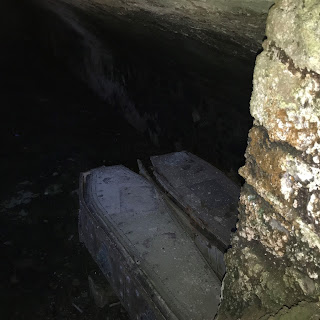I remember this church from my
childhood, as I walked out to it a few times with my Grandpa. He worked in one of the nearby villages and
would check on the church every so often to make sure all was in order. Back then the key was kept above the main
door so that anyone passing by could pop in to shelter or pray. Useful when it was pouring with rain
outside. As a kid I was always
fascinated by the two barred windows at the back of the church. Sitting at ground level these windows gave a
view into the crypts below, where on a good day, if you got your head into just
the right position you could see some of the coffins inside. Grandpa always said he would get hold of the
keys for the crypt and show us down there, but never did. No doubt if he had I would have been
disappointed, as I was hoping to see stacks of skeletons everywhere rather than
just and a few more crumbling coffins.
The first records of Polwarth Church
are from 1242 when the Bishop of St Andrews, David de Bernham, consecrated the
church and dedicated it to St Mungo. The
church was almost completely rebuilt in 1703.
In 1683, Sir Patrick Hume hid for four
weeks in the crypt at the church after being implicated in the Rye House Plot.
This was a plot to assassinate King Charles II and his brother. His daughter, Grizel (Lady Grizel Baillie),
smuggled him food while he was in hiding.
Hume and his family then fled to the Netherlands only returning to
Scotland after the Glorious Revolution when King William of Orange took the
crown in both England and Scotland.
The church closed in 2004 and was sold
off by the Church of Scotland. It is now
privately owned.
What a quiet spot is the auld
kirk-yaird,
That is a' thro' the week deserted,
Except when some mourner's wail is
heard
By the grave o' some dear departed!
E'en noo on this joyous Sabbath morn
Nae jarrin' noise to the ear is borne,
For the talk is as meek as the faces
worn
When they gang to the Kirk at Polart.
The full poem can be found at –
http://scotstext.org/roughs/robert_mclean_calder/robert_mclean_calder.asp
The Skulferatu that accompanied me on this trip was placed into a gap in the drystone wall at the back of the churchyard.











No comments:
Post a Comment